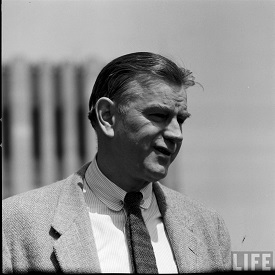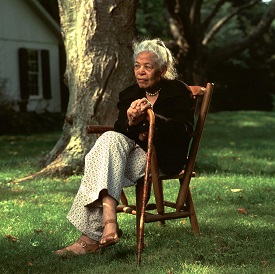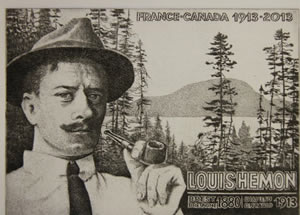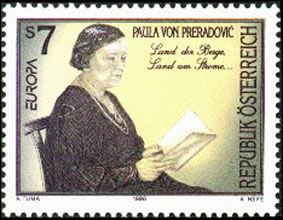De Amerikaanse dichter en schrijver Paul Engle werd geboren op 12 oktober 1908 in Cedar Rapids. Zie ook alle tags voor Paul Engle op dit blog.
Uit: A Lucky American Childhood
The name Paul Engle trembles on his tongue.
Should it be bellowed, sneered, whined, bleated, sung?
Look at his broken (football) crooked nose,
His shifty way of letting his eyes close
When they look into your own eyes. Too grim.
How could you buy an old used car from him?
Yet as a father what he gave was love.
Yet as a husband what he gave was love.
He likes his liquor, but his hands don’t’ shake.
He talks too much, merely for talking’s sake.
He seldom bores you, but he makes you mad.
He is not really evil, only bad.
He likes all animals, dog, cat and woman
(For whom his love is human—all-too-human).
Some think him worse, now, than he really is.
Some think him better than he really is.
His hands still calloused from his working youth,
His brain is calloused bending too much truth.
Eyeball to eyeball, he and his memory stare
As glittering mirrors into mirrors’ glare.
Let it be said of Engle in his praise:
He loved his life-crammed, people-crowded days,
The rough of rock, the autumn’s hovering haze,
Skin rubbed on skin, the loving, living blaze,
Bird wing far brighter than the air it beats,
Cabbageworm greener than the leaf it eats,
The high hysteria that lies behind
The howling horror of the manic mind.
Let it be stated clearly—he was cruel,
But only to the cruel and to the fool.
He liked to laugh, and yet he laughed too loud.
He loathed the selfish, greedy, and proud
And told them so in language of too much lip.
Each day his eyes run the fast razor’s track,
But see the radiant mirror sneering back.

In 1961
De Amerikaanse schrijfster Ann Petry werd geboren op 12 oktober 1908 in Old Saybrook, Connecticut. Zie ook alle tags voor Ann Petry op dit blog en ook mijn blog van 12 oktober 2010.
Uit: The Street
“The snow fell softly on the street. It muffled sound. It sent people scurrying homeward, so that the street was soon deserted, empty, quiet. And it could have been any street in the city, for the snow laid a delicate film over the sidewalk, over the brick of the tired, old buildings; gently obscuring the grime and the garbage and the ugliness.
(…)
She got off the train, thinking that she never felt really human until she reached Harlem and thus got away from the hostility in the eyes of the white women who stared at her on the downtown street and in the subway. Escaped from the openly appraising looks of the white men whose eyes seemed to go through her clothing to her long brown legs. On the trains their eyes came at her furtively from behind newspapers, or half-concealed under hatbrims or partly shielded by their hands. And there was a warm, moist look about their eyes that made her want to run.
These other folks feel the same way, she thought-that once they are freed from the contempt in the eyes of the downtown world, they instantly become individuals. Up here they are no longer creatures labeled simply ‘colored’ and therefore all alike. She noticed that once the crowd walked the length of the platform and started up the stairs toward the street, it expanded in size. The same people who had made themselves small on the train, even on the platform, suddenly grew so large they could hardly get up the stairs to the street together. She reached the street at the very end of the crowd and stood watching them as they scattered in all directions, laughing and talking to each other.”

De Franse schrijver Louis Hemon werd geboren op 12 oktober 1880 in Brest in Bretagne. Zie ook alle tags voor Louis Hemon op dit blog en eveneens mijn blog van 12 oktober 2010.
Uit: Maria Chapdelaine
“– Eh bien, monsieur Larouche, ça marche-t-il toujours de l’autre bord de l’eau ?
– Pas pire, les jeunesses. Pas pire !
Chacun tirait de sa poche sa pipe et la vessie de porc pleine de feuilles de tabac hachées à la main et commençait à fumer d’un air de contentement, après une heure et demie de contrainte. Tout en aspirant les premières bouffées ils causaient du temps, du printemps qui venait, de l’état de la glace sur le lac Saint-Jean et sur les rivières, de leurs affaires et des nouvelles de la paroisse, en hommes qui ne se voient guère qu’une fois la semaine à cause des grandes distances et des mauvais chemins.
– Le lac est encore bon, dit Cléophas Pesant, mais les rivières ne sont déjà plus sûres. La glace s’est fendue cette semaine à ras le banc de sable
en face de l’île, là où il y a eu des trous chauds tout l’hiver.
D’autres commençaient à parler de la récolte probable, avant même que la terre se fût montrée.
– Je vous dis que l’année sera pauvre, fit un vieux, la terre avait gelé avant les dernières neiges.
Puis les conversations se ralentirent et l’on se tourna vers la première marche du perron, d’où Napoléon Laliberté se préparait à crier, comme toutes les semaines, les nouvelles de la paroisse.
Il resta immobile et muet quelques instants, attendant le silence, les mains à fond dans les poches de son grand manteau de loup-cervier, plissant le front et fermant à demi ses yeux vifs sous la toque de fourrure profondément enfoncée ; et quand le silence fut venu, il se mit à crier les nouvelles de toutes ses forces, de la voix d’un charretier qui encourage ses chevaux dans une côte.”

De Oostenrijkse dichteres en schrijfster Paula von Preradović werd geboren op 12 oktober 1887 in Wenen. Zie ook alle tags voor Paula von Preradović op dit blog.
Requiem
Ach, Bruder, von den Buchten her die Brandung schwoll,
Vom Hügel uns ein Duften schwer herüberquoll
Nach Thymian und Ginster und blauem Salbeikraut,
Aus finstergrüner Kiefer, da schrie ein Käuzchen laut.
Zu Häupten hoch die Sterne, die flammten ohne Zahl,
Sie schüttelten von ferne hernieder Strahl um Strahl.
Uns fächelte die Wangen salziger Wind von weit,
Da wir zur Nacht gegangen gaßauf, gaßab zu zweit.
Wir redeten und glühten von Liebe, Gott und Tod,
Wir grübelten und mühten uns bis ans Morgenrot,
Und durch die Stille schmetterten hell unsre Stimmen jung,
Da wir durchs Dickicht kletterten auf steiniger Wanderung.
Verschwunden und versunken ist uns die Heimat lang.
Es ist im Meer ertrunken, was leicht in Lüften schwang.
Das himmlische Geflimmer verlosch im Nebelgrund,
Und, Bruder, ach, auf immer ist mir verstummt dein Mund.

